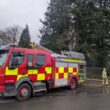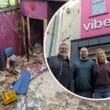
Ahead of International Day for the Elimination of Violence Against Women on November 25, Women’s Aid Armagh Down have organised ’16 Days of Action’ to include a special candlelit vigil to remember the lives of 24 women who have been murdered since 2020.
The organisation also have ambitious plans to improve their “pathways to safety” within the Armagh, Banbridge and Craigavon Borough Council area (ABC area) within the next few years.
Beginning on November 25, the 16 Days of Action will run until December 10 which is also universally recognised as Human Rights Day – a day to recognise the fundamental rights of every human being including equality, life, liberty and security of the person.
The candlelit vigil will also take place on this notable day and while, there is a strategy in place for Women’s Aid organisations to hold individual vigils across the country, Armagh Down will be gathering at 6pm on Market Street, Lurgan.
Speaking to Armagh I, Support Services Manager for Women’s Aid Armagh Down, Helen Cranney said: “The candlelit vigil closes our 16 Days of Action. We plan to gather together and we will read the names of all of the women who have been murdered in the last four years followed by a minute’s silence as a mark of respect and call to action.
“They would love for everyone to attend vigils across the country to ‘remember her light’.”
The candlelit vigil on Market Street has been organised with the support of the McNally family who tragically lost their beloved sister and daughter, Natalie after she was murdered in her Lurgan home on December 18, 2022.
Related: Natalie McNally and Laura Marshall murders prompt motion demanding greater protection for women
Helen explains that the full calendar of events is set to include “information stands at local leisure centres, fundraising on Hill Street, Newry and a series of online events with the Southern Trust and training with staff about the connection between domestic abuse and acquired brain injury.”
However, Helen made clear that the 16 Days of Action denotes only a small portion of the work they do throughout the year, with ambitious plans in the pipeline for the very near future – including finding a solution to the refuge problem in the ABC area.
“We get incredible support from the local community, especially to help families at Christmas,” continued Helen. “But we are still waiting on tenterhooks for funding connected to Ending Violence Against Women and Girls so we can look at opportunities for prevention work or further protection work and then we can wait and see what the Domestic and Sexual Violence strategy brings in terms of an action plan.
“We cover Newry Mourne and Down and the ABC area at the minute, supporting about 190 women in total and very sadly we have just over 300 on a waiting list to get in for support.
“The refuge is full, as it always is, and we could fill the refuge four times over.
“I suppose, for me, in terms of ABC we are always trying to let people know that there is no safe refugee accommodation in that area.”
Some 14 years ago, Portadown had been home to a Women’s Aid refuge but Helen explained that due to “internal reasons” and the “lack of an appetite for refuge” the pre-existing organisation that ran the facility made the difficult decision to close.
The focus then shifted to providing better support for women in the community.
However, Helen now asserts that the appetite for refuge has regrettably returned.
She said: “14 years down the line and we still sit with no refuge and as a result we have been unable to accommodate maybe 90 women.
“We will never say ‘there is no room at the inn’ but we try to get them into another refuge on a regional basis or work with Housing Executive for emergency accommodation but then we can also help to source somewhere with a family connection or, really sadly, unfortunately sometimes we have to safety plan with her to stay at her own home and then add her to the waiting list for residency.
“We know that we get about 50% of our refuge referrals from the ABC area. It’s a fairly even split between Newry Mourne and Down and ABC, so we know we could fill that refuge.”
The refuge issue is something Helen says they are “constantly bringing up” but explained that plans to construct a £3m Centre of Excellence in Newry are taking precedence.
The new centre will focus on providing intervention strategies for children and young people as well as their parents on a larger scale and will undoubtedly be a valuable asset to the Newry, Mourne and Down and wider community.
But, the push for ABC’s refuge remains a focus as demand – sadly – continues to grow.
Speaking to the recent apparent increase in reports of domestic violence, Helen said: “I think one of the reasons we are seeing more people reporting is because there is more awareness the pathways to safety are advertised better.
“We cannot ask people to leave if we cannot provide the pathway to safety so part of it is that, thankfully, there is a massive shift towards calling it out as being something that shouldn’t be happening and knowing that you will be believed.
“What we have to do is make sure that there is sustainable and secure funding for investment in those frontline services so it’s there for when someone does pick up the phone.
“The number of women who have been murdered in the last short while and for four women to die in six weeks is horrendous.
“The other thing we are starting to pull the cover back on but not really exposing yet is the number of women who die by suicide where domestic abuse was a very real feature of their lives.
“That is something we are looking at to peel back the layers on and consider domestic suicide because that person has taken their life because they tried to get help or they couldn’t get help or there was no escape for them and that was the only answer that they felt was available to them.”
As an advocate for those women, Helen understands their common frustrations. She – and those who work alongside her – actively work to address concerns and put better strategies in place.
“By the time someone is making a disclosure of domestic abuse they are already at chronic levels of fear,” added Helen. “They are not putting their hand up at the very first minute that there’s a rule enforced in their relationship and they feel they need to comply with that rule.
“When they have reached that point and they reach out for help, and that help is not what they are sold, that puts somebody back into the closet or back into that room or back behind that door.”
Addressing the immense internal strength of those living with domestic violence, she said: “You are keeping yourself alive and your children alive and risk assessing every minute of every day and managing consequences all the time.
“Women are coming through the door feeling ashamed, like they have failed, weak, like they are useless and worthless and we say ‘look at what you have been doing and look at what you have done, you walked in through our door, that’s the bravest thing you can do’.
“What we want to do is advocate for her with the services. The systems need to improve and I’m hopeful with the political will, and with the push with the Violence Against Women and Girls and the Domestic and Sexual Violence strategies that at least we can have some framework for accountability.
“Women’s aid are part of an answer, we are not the whole answer. It sometimes just feels like there is so much pain out there and it needs to have a whole community response.”





